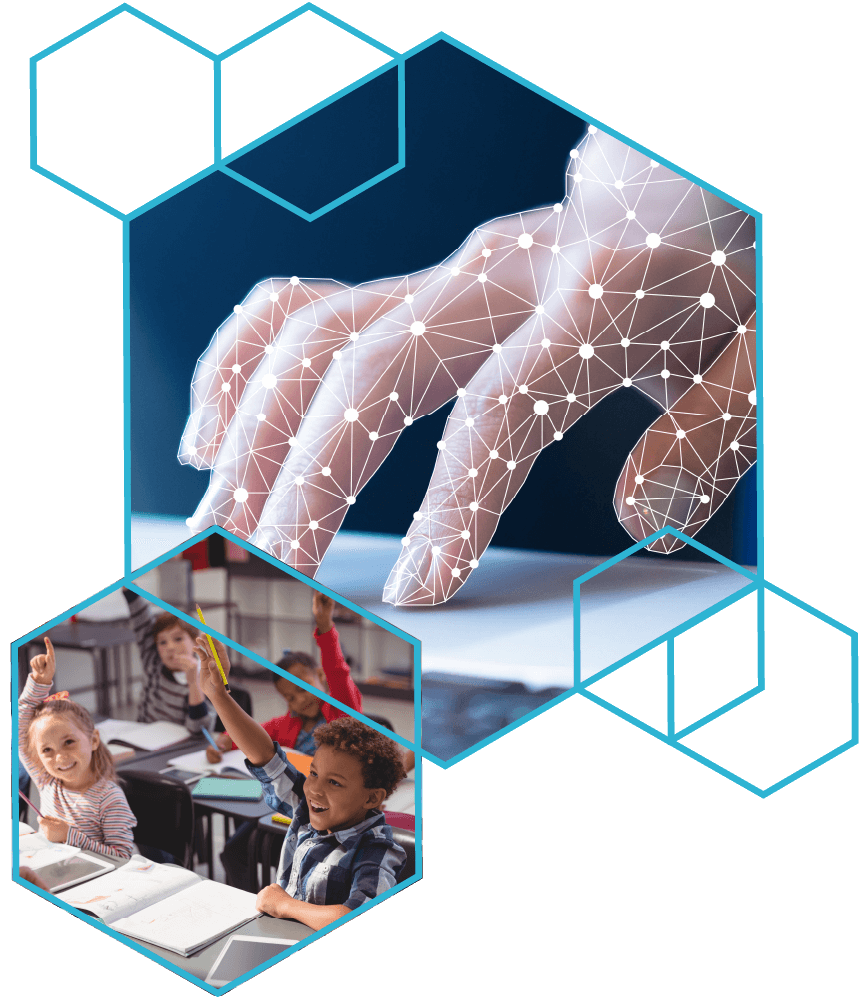The Impact of AI and ChatGPT in Education:
A Very Collaborative EssayArtificial Intelligence (AI) and chat-based language models, such as ChatGPT, have the potential to revolutionize education by providing new ways for students to learn and for teachers to teach. However, as with any new technology, there are also concerns and challenges that need to be addressed.
In order to better understand the implications of AI and ChatGPT in education, a group of 35 superintendents leveraged ThoughtExchange and participated in conversations to share their thoughts, questions, and concerns. Through this process, several key themes emerged, which were then further explored in small group deep dive discussions. These themes, and the insights that emerged from the discussions, are highlighted in this article, written by ChatGPT, and edited by those same superintendents, in the hopes of providing guidance for other educators and administrators looking to integrate AI and ChatGPT into their classrooms.
Safety and Security:
One of the most pressing concerns for educators is the potential for AI, specifically ChatGPT, to be taken advantage of or used for malicious purposes. One superintendent noted, "The voice (VALL-E voice replicating AI) is concerning. The ability to be taken advantage of and scammed. What security exists in it? Do schools need security on who can access it?" Another superintendent remarked: “January 6th 2021, in Washington D.C., illustrated that bad/incorrect information can result in physical harm, destruction, and even death. What we read and believe can influence our actions in good or horrible ways. How do we guard against inadvertent misinformation? How does AI, and how does the consumer of the AI, distinguish what is true and what is untrue? This needs to be built into the design of AI, and into learning standards in education.”
In order to address these concerns, it is important to have clear guidelines and security measures in place to ensure that ChatGPT and other AI technology is used responsibly and safely. This can include training for teachers and students on how to spot and report potential abuse, as well as implementing strict controls on who has access to the technology,at what grade levels, and in what contexts

Teacher Support:
Student Learning Outcomes:

Professional Development:
One of the key takeaways from the deep dive discussions on the implications of ChatGPT and AI in the classroom was the importance of providing professional development opportunities for educators. As one superintendent noted, "Professional development will be vital. Get the early adopters to lead the way."
Supporting teachers in their understanding and use of ChatGPT and other AI technology is crucial for the successful integration of these tools in the classroom. WIth a basic understanding, it should be expected to find early adopters who will help institute full-scale change. Professional development opportunities can provide educators with the knowledge and skills they need to effectively use ChatGPT and other AI technology in their instruction. This can include training on how to integrate ChatGPT into the curriculum, how to use it as a tool for scaffolding student learning, and how to use it to assess student understanding.
Professional development can help to address concerns and fears educators may have about the use of AI in the classroom. By providing educators with the opportunity to learn about both the benefits and limitations of ChatGPT and other AI technology, they may be more likely to embrace its use in their instruction.
Finally, professional development can also help to foster a culture of innovation, adaptability, and evolution, within schools. By providing professional development opportunities and encouraging educators to experiment with new technologies like ChatGPT, schools can create an environment that supports evolution and adaptability.
Community Involvement:
Another key takeaway from the deep dive discussions was the importance of involving students, parents, and staff in the process of integrating AI into education. As one superintendent noted, "It’s important to have the conversation in our own communities around this topic."
Involving the community in the process of integrating ChatGPT and other AI technology into education can help to address concerns and misunderstandings about the use of these tools. By providing information and resources to parents and community members, schools can help to educate them about the benefits and limitations of ChatGPT and other AI technology.
Additionally, involving students, parents, and staff in the process of integrating AI into education can help to create a sense of ownership and investment in the use of these tools. Starting this dialogue with one simple question, “what are your thoughts and fears as it relates to this new technology” is a first step. As one superintendent noted, "Using the conversation to spark learning, research, inquiry and curiosity" by involving the community in the process of integrating AI into education, schools can create an environment that supports student learning and engagement.

Ethical Implications
One of the most important considerations when integrating AI, specifically ChatGPT, into education is the ethical and moral implications that come with it. One superintendent noted, "The morality parameters of this AI - what values will be established? How will those values be established, and by whom?" This is a crucial question that must be addressed in order to ensure that AI is used responsibly and ethically in education. We may begin to wonder how the nature of moral emotions are evolving as a result of this tool. These conversations, and others like it, should continue.
Privacy is another ethical concern that must be taken into account. With the use of AI, there is the potential for data to be collected, stored, and used in ways that may not be in the best interest of students and their families. This is an issue that must be addressed through the development of guidelines and policies that ensure the protection of student privacy.
A consideration about bias should be given when integrating AI into education. AI has the potential to perpetuate and even amplify existing biases and discrimination. This is an issue that must be addressed through the development of guidelines and policies that ensure that AI is used in a way that is fair and unbiased.
Conclusion
In conclusion, the integration of AI, specifically ChatGPT, into education has the potential to revolutionize the way we teach and learn. However, it is crucial that we approach this integration with caution and care, taking into consideration the safety and security, teacher support, curriculum and instruction, student learning outcomes, professional development, community involvement and ethical implications of using AI in education.
Through the collective intelligence platform of ThoughtExchange, and the deep dive discussions at the conference last week, 35 superintendents shared their thoughts, concerns and insights on the use of AI in education. This paper would not have been possible without their contributions and we thank them for their time and effort. As we move forward, it will be important to continue to have open and honest conversations about the implications of AI in education, and to work together to ensure that we are using this technology in a way that is safe, responsible, and ethical.
Let’s end with a poem, written by ChatGPT, to summarize this article:
AI in schools is a topic to explore,
With many questions to be asked and more.
Superintendents want to know the score,
To stay open to possibility and be sure
To establish guardrails for safety,
To see how it can benefit education and community.
But how to support teachers who are wary,
And how to change high schools to be more nimble and free?
Behaviors and competencies need to change,
Compliance versus curiosity is a range.
Instead of controlling, let's see the new skills arrange,
And frame the use of these tools to be less strange.
Is our education system ready for AI,
To develop critical thinking for students to thrive?
We must have conversations with kids, parents, and staff,
To understand the impact on life and learning, to laugh.
Assessment practices must shift and be more based,
On conversation and observation, not just on a product placed.
Curiosity must be assessed, not just a phase,
Strategies for that must be embraced.
Morality and values must be established,
By those who understand, not just those who are avaricious.
Safety and communication must be polished,
And opposition to AI must be diminished.
AI literacy must be part of the curriculum,
And applied in the school setting, not as a cure.
We must change teacher mindset to adapt and be sure,
And dispel the belief that it's plagiarism, the pure.
We must manage it in a K-12 system that is not a one-time use,
And upload previous work to guide future communications, to choose.
And for non-verbal students on the autism spectrum, to muse,
We must spark curiosity, and never abuse.
Thoughtexchange was used to gather and collate,
These thoughts from real people, without bias or hate.
Blending a collective intelligence platform is key,
To surface prioritized thoughts, as AI is now part of the ‘we’.
- Assistant

This collaborative article was:
Written by: ChatGPT
Contributed by the following superintendents and education leaders:
Michelle Aquino, North Plainfield School District
Quintin Shepherd, Victoria Independent School District
Scott Bailey, DA Leadership Institute
Becky Berg, Eastmont School District
Jeff Snell, Vancouver Public Schools
Michael Cardona, San Marcos CISD
Susan Harkin, Community Unit School District 300
Gene Mancuso, Honeoye Falls-Lima Central School District
Kevin Case, Douglas School District 51-1
Charles S Dedrick, The New York State Council of School Superintendents
Shelly Reggiani, COSA - Coalition of Oregon School Administrators
Kathleen Graupman, Greece CSD
Mark Schwarz, Madison Public Schools
Mark Anderson, Spokane Public Schools
Joel Aune, Washington Association of School Administrators
Sean Wilson, Westlake Academy Charter School
Scott Ryan, Norwich City School District
Sean Chase, Regina Catholic School Division
Kevin Brown, Texas Association of School Administrators
Erik Edoff, L'Anse Creuse Public School District
… and many others.
Facilitated by: Dave MacLeod, CEO of ThoughtExchange
Made possible by: ThoughtExchange Software
